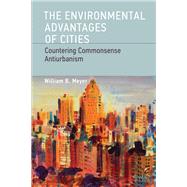The Environmental Advantages of Cities Countering Commonsense Antiurbanism
, by Meyer, William B.- ISBN: 9780262518468 | 0262518465
- Cover: Paperback
- Copyright: 3/15/2013
Conventional wisdom about the environmental impact of cities holds that urbanizationand environmental quality are necessarily at odds. Cities are seen to be sites of ecologicaldisruption, consuming a disproportionate share of natural resources, producing high levels ofpollution, and concentrating harmful emissions precisely where the population is most concentrated.Cities appear to be particularly vulnerable to natural disasters, to be inherently at risk fromoutbreaks of infectious diseases, and even to offer dysfunctional and unnatural settings for humanlife. In this book, William Meyer tests these widely held beliefs against the evidence. Borrowingsome useful terminology from the public health literature, Meyer weighs instances of "urbanpenalty" against those of "urban advantage." He finds that many supposed urbanenvironmental penalties are illusory, based on commonsense preconceptions and not on solid evidence.In fact, greater degrees of "urbanness" often offer advantages rather than penalties. Thecharacteristic compactness of cities, for example, lessens the pressure on ecological systems andenables resource consumption to be more efficient. On the whole, Meyer reports, cities offer greatersafety from environmental hazards (geophysical, technological, and biological) than more dispersedsettlement does. In fact, the city-defining characteristics widely supposed to result inenvironmental penalties do much to account for cities' environmental advantages. As of 2008(according to U.N. statistics), more people live in cities than in rural areas. Meyer's analysisclarifies the effects of such a profound shift, covering a full range of environmental issues inurban settings.






